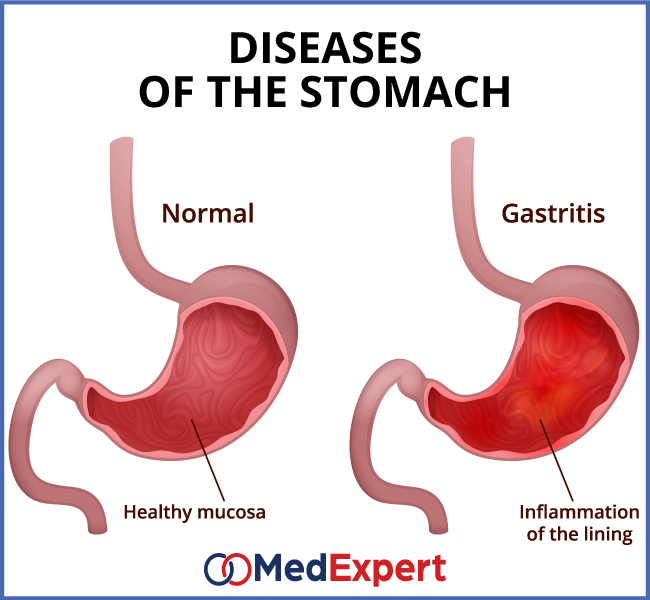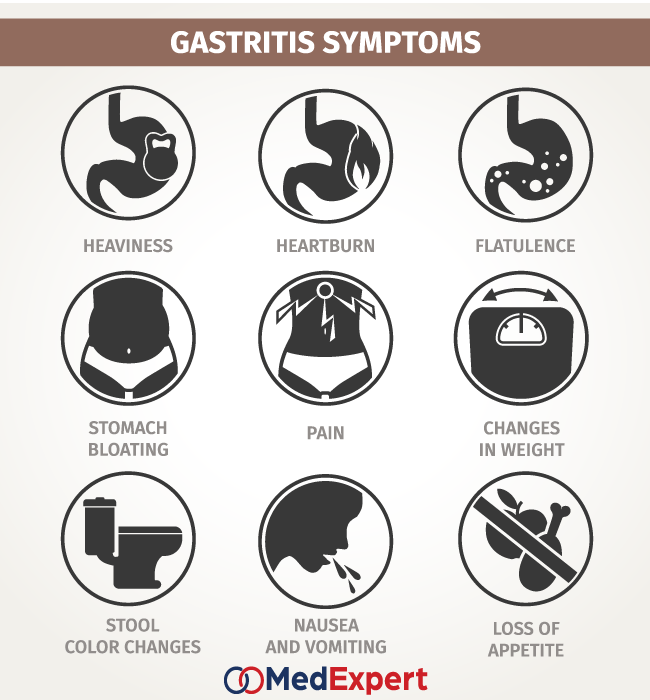GASTRITIS
Acute or chronic inflammation of stomach mucous lining, accompanying by abnormal changes – this is how doctors define gastritis. Nausea, vomiting, frequent indigestions are some of gastritis symptoms. Gastritis treatment depends on the form of the disease (acute or chronic), severity of symptoms and causes triggering development of this condition. Below we will talk about causes of gastritis, its symptoms and treatment options available in more detail.
Gastritis is an inflammation of the stomach lining that occurs when a weakness in the mucus-lined barrier that protects your stomach wall allows your digestive juices to damage and inflame the lining of your stomach. This condition can either occur:
- Very suddenly – this is known as acute gastritis
- Gradually – know as chronic gastritis
Gastritis may last for an extended period of time.

WHAT ARE SOME KNOWN CAUSES OF GASTRITIS?
This disorder can be caused by irritation from chronic vomiting, stress, excessive alcohol use or the use of certain medications such as aspirin or other anti-inflammatory drugs. It may also be caused by any of the following:
- Helicobacter pylori (H. pylori): A bacteria that lives in the mucous lining of the stomach; without treatment, infection can occur, leading to ulcers and in some cases, stomach cancer.
- Pernicious anaemia: A form of anaemia that occurs when your stomach lacks a naturally occurring substance needed to correctly absorb and digest vitamin B12.
- Bile reflux: A backflow of bile into the stomach from the bile tract (which connects to the liver and gallbladder).
- Infections: Caused by bacteria and viruses. If left untreated, gastritis can lead to a severe loss of blood and may increase the risk of developing conditions such as stomach cancer.
GASTRITIS SYMPTOMS
Symptoms of gastritis vary among individuals, and in many cases there are no noticeable symptoms. However, if there are symptoms present they generally include:
- Nausea, vomiting or recurrent upset stomach
- Abdominal bloating
- Abdominal pain
- Indigestion
- Burning or gnawing feeling in the stomach between meals or at night
- Hiccups
- Loss of appetite
- Vomiting blood or coffee ground-like material
- Black, tarry stools

GASTRITIS TREATMENT OPTIONS
Treatment of gastritis largely depends on its specific cause. Acute gastritis caused by nonsteroidal anti-inflammatory drugs or alcohol can be treated by discontinuing the use of these substances. Chronic gastritis caused by H. pylori infection is treated with antibiotics. In most cases, you also take medications that treat stomach acid to decrease your signs and symptoms whilst allowing your stomach to heal properly. Medications used to treat gastritis include:
- Antibiotic medications to kill H. pylori: If you have H. pylori in your digestive tract, your doctor may recommend a combination of the following antibiotics:
- Clarithromycin (Biaxin)
- Amoxicillin or Metronidazole (Flagyl)
Ensure you take the full antibiotic prescription, usually for 10 to 14 days.
- Medications that block acid production and promote healing: Proton pump inhibitors reduce the amount of acid produced by blocking the parts of cells that produce acid. These drugs include prescription and over-the-counter medications such as:
- Omeprazole (Prilosec)
- Pantoprazole (Protonix)
- lansoprazole (Prevacid)
- Rabeprazole (Aciphex)
- Esomeprazole (Nexium)
- Dexlansoprazole (Dexilant).
Long-term use of proton pump inhibitors, particularly in high doses, can heighten the risk of getting hip, wrist and spinal fractures. Check with your doctor as to whether a calcium supplement may reduce this risk.
- Medications to reduce acid production: Acid blockers — also known as histamine (H-2) blockers — reduce the amount of acid released into your digestive tract, relieving gastritis pain and promotes the healing process. Acid blockers are available over-the-counter or by prescription. These include:
- Ranitidine (Zantac)
- Famotidine (Pepcid)
- Cimetidine (Tagamet)
- Nizatidine (Axid)
- Antacids that neutralize stomach acid: Your doctor may choose to include an antacid in your drug program. Antacids work to effectively neutralize existing stomach acid and providing rapid pain relief. Side effects can include constipation or diarrhoea.
DIAGNOSING GASTRITIS
- History taking and physical exam: The first step is to take a physical exam. Your doctor will ask you relevant questions about your symptoms as well as your lifestyle, eating habits and your family medical history.Although your doctor is likely to suspect gastritis after talking to you about your medical history and performing an exam, you may also have other tests to pinpoint the exact cause.
- Urea breath test (UBT): The urea breath test (UBT) is used for diagnosing the presence of the bacterium, Helicobacter pylori (H. pylori) in the stomach. For this test, the patient swallows a capsule containing urea made from an isotope of carbon. (Isotopes of carbon occur in very small traces in nature, and can be measured using special testing machines.)
If the virus is present in the stomach, the urea is broken down and turned into carbon dioxide. The carbon dioxide is absorbed across the lining of the stomach and into the bloodstream. It then travels in the blood to the lungs where it is excreted via the patient’s breath. Finally, samples of exhaled breath are collected, and the isotopic carbon in the exhaled carbon dioxide is measured.
- Gastroscopy (Upper endoscopy): Endoscopy is a test that allows the doctor to visually examine the inside of your oesophagus and stomach. During an endoscopy, your doctor will insert a thin, flexible tube equipped with a light and camera (endoscope) down your throat. At this time, your doctor may also opt to collect a sample of tissue (biopsy) for further testing to be performed.


